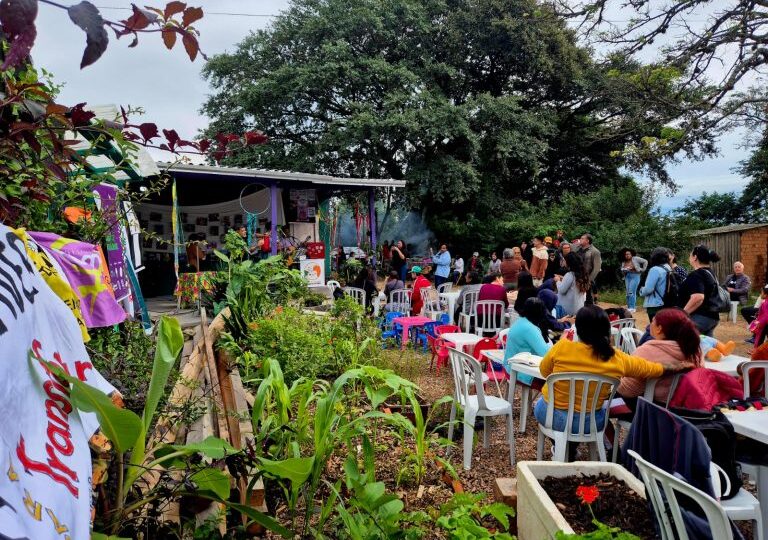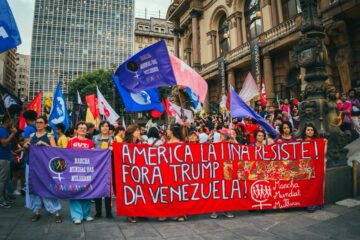In Brazil’s outskirts, climate change has deeply affected our lives, and for this reason, it has been at the center of our grassroots organizing with women in the affected territories. During the pandemic, in one of the outskirts areas of Porto Alegre (the capital of Rio Grande do Sul, in southern Brazil), we organized a space for community action and collective struggle against food insecurity amid the health and environmental crisis.
At that time, we created a space of solidarity, resistance, and self-organization for women who were losing their jobs and facing the uncertainty of the moment. As hunger worsened, we occupied an abandoned plot of land, once used as a dumping ground, to transform it, plant food, and organize the women of the territory. Since then, in 2020, we have consolidated this space of struggle called Coletivo Periferia Feminista (Feminist Outskirts Collective), an initiative of the World March of Women and Friends of the Earth Brazil, which has continued to grow stronger.
Our name, Coletivo Periferia Feminista, sometimes causes surprise. Many women, because of their relationship with religion or other beliefs, are initially taken aback, but once they start participating and understanding what we are building, they embrace the idea. They come to see themselves as part of this territory and as women with the power to live and build new lives based on solidarity and collective organization.
Even before the floods in Rio Grande do Sul, our struggle was already shaped by droughts and intense heat. Many families in the area went more than 60 days without running water, relying on water trucks, a common reality in many of Brazil’s outskirts. Water insecurity deeply affects our communities. In response, we began seeking solutions such as rainwater harvesting, organizing women around this cause, since relying on water trucks is especially difficult for older women and those with health issues.
All of this has shaped our struggle and our organizing. The women in the territory began to see themselves as a collective, understanding the importance of being organized. Many had never participated in spaces like this before. We brought the movement, the World March of Women, and popular feminism to the forefront to discuss and reflect on the broader political context.
Recently, we faced the worst environmental disaster in the history of Rio Grande do Sul. The floods that struck in mid-2024 affected nearly 1.5 million people across 424 municipalities. Many lost their homes, memories, and territories. We witnessed the negligence of the State, neoliberal policies, and patterns of urban exclusion that render women invisible. In that moment, solidarity actions, social movements, and women’s initiatives were crucial in building networks of care and support for families. In Porto Alegre specifically, many neighborhoods were severely affected by the floods.
Our collective is based in a hillside area, and there’s an illusion that hillsides are safe from flooding, but we face flooding from springs and landslides. Families who lost their homes began to move upward in search of shelter. The landscape of our community changed dramatically. It was then that we opened our community kitchen, originally used for women’s gatherings and collective meetings. We began receiving people who arrived in despair, devastated after losing everything, carrying heartbreaking stories of survival.
Our kitchen began welcoming these people and preparing meals, at one point distributing more than a thousand lunchboxes a day. We had no prior experience running a large-scale kitchen, but hunger was overwhelming, and people had nowhere else to turn. Public policies from our governments were focused on a few shelters and fundraising campaigns, but they did not reach the population in practice.
Those who truly welcomed people and addressed food insecurity were the social movements — especially through women’s work within their territories, running solidarity kitchens and organizing shelters. We also had to deal with many cases of violence in these shelters, which were mostly managed by volunteers.
It is important to talk about volunteering and solidarity: they are essential, but they cannot replace public policy or allow the State to shift this responsibility onto women. Structural policies are crucial in moments like these. Solidarity networks were fundamental, but they also revealed issues of overwork and the invisibility of women’s labor.
Today, the kitchens remain active, preparing food for distribution throughout the community. Yet we must continue to talk about the invisible and exhausting work carried out by these women, and about how the State offloads its responsibilities without recognizing the value of this essential labor. The vast majority of women working in these kitchens and spaces are Black, poor, working-class women from the outskirts, who have little access to other employment opportunities.
It is essential that this work be recognized through the lens of life sustainability and of a feminist and solidarity economy. Together with these women, we seek to build work initiatives that rebuild perspectives and generate income, ensuring that these actions do not become merely charitable. We must confront the capitalist way of organizing the economy, which is based on the commodification of the commons, nature, time, labor, water, food, and even relationships.
Another important issue is civil defense. In Brazil, it is predominantly male and militarized, disconnected from the communities’ popular knowledge. During crises, it is the women who start calling one another, because they know the territory and its people, and they are the ones who seek solutions together. Official civil defense institutions do not engage with this grassroots action. It is essential to rethink contingency plans and prevention and mitigation strategies from the perspective of women in the territories and through a more collective approach.
There are many layers to this civilizational crisis linked to climate change, which demands radical responses. We want to be part of the reconstruction. The solutions presented by governments often exclude popular and women’s participation. We believe that reconstruction does not mean “returning to normal,” because that “normal” is unjust, unsustainable, exclusionary, patriarchal, and racist. We want reconstruction grounded in feminist perspectives, against neoliberalism and the predatory policies that destroy the environment and life.
We are fighting to defend our territories and our waters. This struggle strengthens us, and we take pride in spreading feminism as a counterpoint to the common sense that prevails in society. It is not an easy task, but we remain firm in resistance, struggle, and resilience. Because we want change, and change is built together with our women.




